Dick Cheney
|
A recent Time Magazine profile of Vice President Dick Cheney opened with the following anecdote:
When Richard Bruce Cheney was a student at Natrona County High School in Casper, Wyo., he was a solid football player, senior-class president and an above-average student. But he wasn't the star. That distinction belonged to Lynne Vincent, Cheney's girlfriend and future wife. A straight-A scholar, Lynne was elected Mustang Queen, the equivalent of most popular girl. She was also a state-champion baton twirler, a big deal in 1950s Wyoming. To begin her routine, Lynne would set both ends of a baton on fire and throw it in the air while her boyfriend stood inconspicuously off to the side holding a coffee can filled with water. When Lynne was finished with her pyrotechnic act, she would pass her flaming baton to Cheney, who, while the audience applauded and Lynne curtsied, would quietly douse the fires by sticking each end of the baton in the coffee can.
Kind of like his current role, except the baton is the world, and the coffee can might be filled with fuel oil.
|
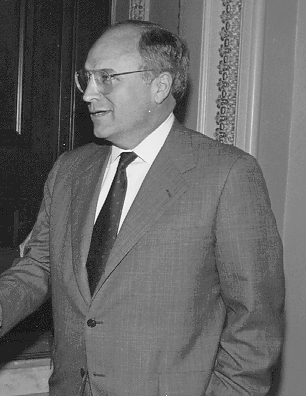
|
 Cheney was born in Lincoln, Nebraska, in January 1941, so his brain crystallized into its current form just before the 1960s introduced the idea of fun into American life. Cheney's picture appears next to the definition of "dour" in the dictionary. He dropped out of Yale in favor of attending the prestigious University of Wyoming, where he majored in political science, and he went on to earn his doctorate from the prestigious University of Wisconsin. In your face, Yale!
Cheney was born in Lincoln, Nebraska, in January 1941, so his brain crystallized into its current form just before the 1960s introduced the idea of fun into American life. Cheney's picture appears next to the definition of "dour" in the dictionary. He dropped out of Yale in favor of attending the prestigious University of Wyoming, where he majored in political science, and he went on to earn his doctorate from the prestigious University of Wisconsin. In your face, Yale!
His life in politics began during the Nixon administration. When he arrived in Washington, D.C., then-Sen. Donald Rumsfeld took Cheney under his wing. Rumsfeld was buddies with Gerald Ford, and when Ford ascended to greatness, he took Rumsfeld along as chief of staff. Rumsfeld took Cheney along, as deputy chief of staff.
When Rumsfeld took a stroll down the road for his first stint as Secretary of Defense in 1975, Cheney rose to glory, serving as Ford's chief of staff for more than a year, before the accidental president was obliterated by Jimmy Carter in the 1976 election.
After washing out of the White House, Cheney adopted the same tactic as when he washed out of Yale -- he fled back to Wyoming. In 1978, he ran for Congress and won handily. In Congress, Cheney rose through the party ranks, endearing himself to Ronald Reagan with his hawkish views on foreign policy and his fevered support for the "Star Wars" missile defense system.
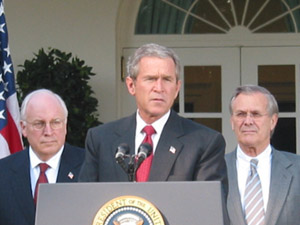 Cheney also distinguished himself as an archconservative during these years, opposing everything from abortion to gun control to Head Start and the Department of Education. If it wasn't a laser-equipped satellite or a lunatic Nicaraguan commando, Cheney wasn't going to waste federal funds on it.
Cheney also distinguished himself as an archconservative during these years, opposing everything from abortion to gun control to Head Start and the Department of Education. If it wasn't a laser-equipped satellite or a lunatic Nicaraguan commando, Cheney wasn't going to waste federal funds on it.
Cheney voted to protect citizens' constitutional right to own armor-piercing bullets. He voted against the Clean Water Act. In fact, he voted against any bill that even included the words "corporate" and "pollution." He voted to protect the sacred constitutional right of a corporation to keep quiet about which local communities they flooded with toxins that cause cancer and birth defects.
 Unlike his constituents' wives, Cheney's baton-twirling spouse Lynne wasn't just sitting around barefoot and pregnant all this time. Under Reagan, Lynne Cheney served as head of the National Endowment for the Humanities, protecting innocent citizens against the depravations of public broadcasting and from potentially confusing "propaganda" content, such as a documentary suggesting Africans might have a few legit gripes about centuries of colonialism, forced slavery and industrial exploitation.
Unlike his constituents' wives, Cheney's baton-twirling spouse Lynne wasn't just sitting around barefoot and pregnant all this time. Under Reagan, Lynne Cheney served as head of the National Endowment for the Humanities, protecting innocent citizens against the depravations of public broadcasting and from potentially confusing "propaganda" content, such as a documentary suggesting Africans might have a few legit gripes about centuries of colonialism, forced slavery and industrial exploitation.
After leaving the NEH, Lynne Cheney threw a few flaming batons through the windows, demanding that the Endowment (and the Endowment for the Arts) be completely dismantled rather than allowing them to promote the sinister aims of the Clinton Administration and defending Clarence Thomas' right to discuss long dongs with underlings.
When George Bush Sr. took office after the 1988 election, Bush settled on Cheney as Secretary of Defense, after his first choice, John Tower, self-destructed in a haze of alcoholic booty calls. Cheney helped lead the Gulf War, personally twisting the arm of King Fahd of Saudi Arabia until the monarch allowed a massive contingent of U.S. troops to set up shop in the kingdom. The resulting Arab outrage was personified by Osama bin Laden, who used the presence of U.S. troops on Saudi soil as the pretext for a declaration of jihad against the West. Once the Gulf War was won, Cheney gutted the Defense Department, firing about a quarter of the military, cutting billions in spending and even scaling back his beloved "Star Wars" program.
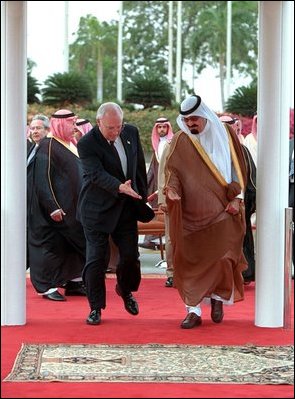 When Bush Sr. was drubbed by Bill Clinton in 1992, Cheney decided it was high time he became a titan of industry. With nothing but insider Washington credentials on his resume, he became chairman and CEO of Halliburton Corp. in 1995. Cheney made millions leading the massive oil industry construction company, while carefully "tweaking" its accounting practices. A 1998 accounting change improved the company's revenues by $234 million over the course of four years.
When Bush Sr. was drubbed by Bill Clinton in 1992, Cheney decided it was high time he became a titan of industry. With nothing but insider Washington credentials on his resume, he became chairman and CEO of Halliburton Corp. in 1995. Cheney made millions leading the massive oil industry construction company, while carefully "tweaking" its accounting practices. A 1998 accounting change improved the company's revenues by $234 million over the course of four years.
Prior to the change, Halliburton had booked sales when a client agreed to pay for cost overruns and contract disputes. After the change, the company took a guess at what they'd collect and booked the sales as a done deal. Despite the fact that the practice looks and sounds a bit sleazy, it's fairly commonplace in the industry. Of course, before Enron, off-balance sheet financing was pretty commonplace too.
The practice was further complicated by the fact that Halliburton was severely on the ropes at the time the change was made. In addition to suddenly boosting the company's bottom line just when Halliburton was going to get slaughtered on the stock market, Cheney and crew "neglected" to inform the SEC about the change until more than a year later. When Cheney quit Halliburton to take the vice presidential nomination in 2000, the company offered him a $20 million going-away gift, characterized as a "retirement package" for his many (five) years of service in the private sector. In a concession to public outrage and concerns that Halliburton was buying access to the White House, Cheney selflessly accepted only $13.6 million, indisputably preserving the ethical integrity of the Executive Branch.
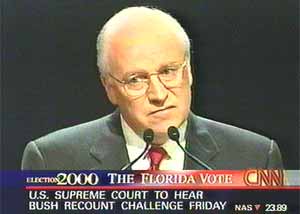 During the 2000 elections, Cheney's history of heart troubles raised serious concerns among the electorate. Voters worried that if Cheney died while in office, his running mate George W Bush might be left in charge of the country. In a concession to these worries, Cheney had a super high-tech pacemaker installed in June of 2001.
During the 2000 elections, Cheney's history of heart troubles raised serious concerns among the electorate. Voters worried that if Cheney died while in office, his running mate George W Bush might be left in charge of the country. In a concession to these worries, Cheney had a super high-tech pacemaker installed in June of 2001.
Nevertheless, the heart issue would continue to haunt him. When al Qaeda attacked the Pentagon and the World Trade Center on September 11, the official version had the vice president shuttled to an emergency bunker in the basement of the White House. According to his own account, he was grabbed by a couple Secret Service agents and carried to the basement, despite being fully conscious and not at all having a heart attack. While the President of the United States jumped in a plane and began a daylong hiding spree, Cheney was running the country from the White House basement, or so the story goes. In the aftermath of the attacks, however, Cheney took a while to resurface.
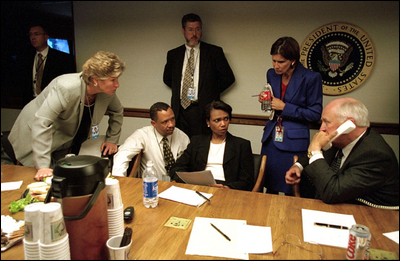 The party line was very reasonable, pointing out that the vice president was being kept in a secret location so that he could take over the country in the event of another terrorist attack. But it was awfully tempting to speculate that he had in fact suffered yet another heart attack while watching the planes hit the Trade Centers. Regardless of what actually happened, Cheney gradually resurfaced, starting with short, limited appearances and expanding back into a somewhat normal role, as American life returned to somewhat normal.
The party line was very reasonable, pointing out that the vice president was being kept in a secret location so that he could take over the country in the event of another terrorist attack. But it was awfully tempting to speculate that he had in fact suffered yet another heart attack while watching the planes hit the Trade Centers. Regardless of what actually happened, Cheney gradually resurfaced, starting with short, limited appearances and expanding back into a somewhat normal role, as American life returned to somewhat normal.
However, Cheney was pissed. His old hawkish ways rapidly reasserted themselves as the hunt for Osama bin Laden began. Almost immediately after the attacks, Cheney and his old crony Donald Rumsfeld (now Secretary of Defense) began beating the war drums for a new invasion of Iraq, despite a complete absence of any evidence that Saddam Hussein had anything at all to do with September 11 or al Qaeda in general.
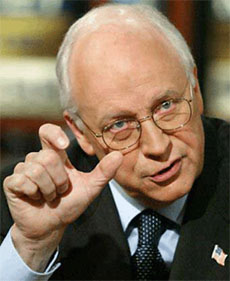 Cheney got his way, eventually. After a staged confrontation at the United Nations, where Secretary of State Colin Powell was roped into making the improbable case for an invasion, the Bush administration discarded all hopes of attracting allies (other than faithful lapdog Britain), despite Cheney's last-minute "can't we be friends" tour of Europe. The U.S. went ahead with the invasion in spring 2003.
Cheney got his way, eventually. After a staged confrontation at the United Nations, where Secretary of State Colin Powell was roped into making the improbable case for an invasion, the Bush administration discarded all hopes of attracting allies (other than faithful lapdog Britain), despite Cheney's last-minute "can't we be friends" tour of Europe. The U.S. went ahead with the invasion in spring 2003.
Cheney's enthusiasm for the war wasn't solely driven by philosophy. His old buddies at Halliburton were finally seeing a return on that $13.6 million (and the $1 million a year in "deferred compensation" still being paid to supplement Cheney's measly six-figure government salary). Halliburton's first quarterly earnings report at the end of the short second Gulf War saw profits double from the previous period (more than $20 million), a gain which news reports comically characterized as coming "despite" the war.
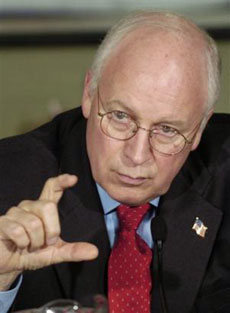 Halliburton's construction and engineering subsidiary has been paid nearly $1 billion through government contracts containing profit-guarantees, and various other contracts initiated since the company's former CEO arrived in the White House. Halliburton has built military bases in the former Soviet Union and Turkey, and it made $33 million building jail cells for terrorists at Camp X-Ray. (In all fairness, even these contracts don't make up for Cheney's major accomplishment as CEO, an acquisition which is expected to cost Halliburton upwards of $4 billion in asbestos liabilities.)
Halliburton's construction and engineering subsidiary has been paid nearly $1 billion through government contracts containing profit-guarantees, and various other contracts initiated since the company's former CEO arrived in the White House. Halliburton has built military bases in the former Soviet Union and Turkey, and it made $33 million building jail cells for terrorists at Camp X-Ray. (In all fairness, even these contracts don't make up for Cheney's major accomplishment as CEO, an acquisition which is expected to cost Halliburton upwards of $4 billion in asbestos liabilities.)
Just before the Iraq war started, the U.S. Army Corps of Engineers awarded Halliburton an "emergency" contract for oil fields reconstruction, which was awarded without the usual government bidding process because of said "emergency" (and despite the fact that the invasion wasn't on any particular timetable and the fact it had been in the works for a year and a half).
The deal was authorized for up to $7 billion, but the Army didn't trash the country with sufficient enthusiasm to make the whole amount, and the actual size of the deal is now estimated at $600 million (assuming Halliburton survives the lawsuits from competitors who inexplicably feel that something fishy is going on here).
A disappointment to be sure, but Cheney has four more years to make it up to them. And then there's always Syria... And Iran... And...
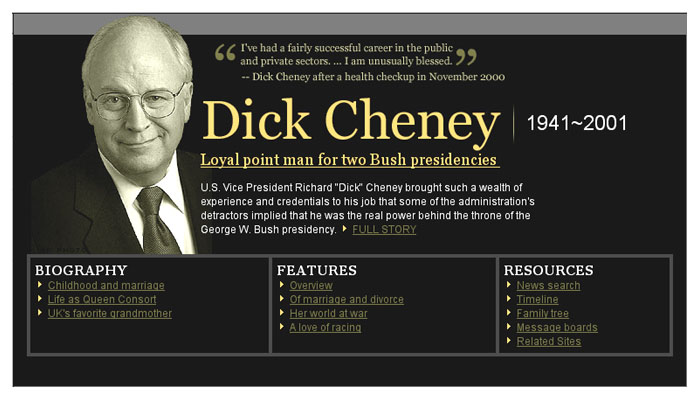
Timeline
| 30 Jan 1941 |
Richard Bruce "Dick" Cheney born, Lincoln NE. |
| 14 Aug 1941 |
Lynne Ann Vincent born, Casper, WY. |
| Nov 1962 |
Dick Cheney arrested for drunk driving. |
| 1963 |
Dick Cheney arrested for drunk driving, again. |
| 1963 |
Drops out of Yale. |
| 29 Aug 1964 |
Marries high school sweetheart Lynne Anne Vincent. |
| 1965 |
Graduated University of Wyoming. |
| Oct 1965 |
Selective Service subjects married men without children to the draft. |
| 1965 |
Seeks a 3-A deferment (has dependents) when Lynne is ten weeks pregnant. |
| 28 Jul 1966 |
First child born, nine months and two days after Selective Service announced that married men without children were subject to the draft. Whew, that was close. |
| Nov 1975 |
Appointed Gerald Ford's White House Chief of Staff, a position he holds for two years. |
| 1977 |
Elected six times to the House of Representatives for Wyoming's only seat. |
| 1978 |
Dick Cheney suffers a heart attack. |
| 1981 |
Lynne Cheney publishes Sisters, a romance novel about the Old West with prominent lesbian themes. |
| 1984 |
Dick Cheney suffers a heart attack. |
| 1988 |
Dick Cheney suffers a heart attack. |
| Aug 1988 |
Dick Cheney undergoes quadruple heart bypass surgery. |
| 1988 |
Elected House Minority Whip. |
| 1989 |
"I had other priorities in the '60s than military service." |
| Mar 1989 |
Dick Cheney appointed George HW Bush's Secretary of Defense, where he presided over the Operation Just Cause (the invasion of Panama) and Operation Desert Storm. |
| 1991 |
Pete Williams, Cheney's assistant secretary of defense for public affairs, outed by Advocate cover story as homosexual. |
| Jun 1999 |
Daughter Mary Cheney: "The reason I came to work here [Coors' Brewing Co.] is because I knew several other lesbians who were very happy here." Cheney was then Coors' liaison to the gay community. Interview by lesbian magazine Girlfriends. |
| 3 Jul 1991 |
Awarded Presidential Medal of Freedom by George HW Bush. |
| 1995 |
Becomes Chairman and CEO of Halliburton. |
| 23 Jun 1998 |
"The good Lord didn't see fit to put oil and gas only where there are democratically elected regimes friendly to the United States. Occasionally we have to operate in places where, all things considered, one would not normally choose to go. But, we go where the business is." Speech, Cato Institute. |
| Jul 2000 |
Karl Rove: "Those heart attacks occurred in the '70s and '80s, and he then served as secretary of defense in President Bush's administration and presided over Desert Storm... I don't know of a more stressful situation than being secretary of defense during an armed combat, and he seemed to do just fine." CBS. |
| 30 Jul 2000 |
In response to a query from Cokie Roberts about Cheney's lesbian daughter, Lynne Cheney retorts: "Mary has never declared such a thing. I have two wonderful daughters. I love them very much. They are bright. They are hard working. They are decent. And I simply am not going to talk about their personal lives. And I'm surprised, Cokie, that even you would want to bring it up." ABC This Week.
|
| 22 Nov 2000 |
Vice President-elect Dick Cheney suffers a heart attack. |
| 22 Nov 2000 |
"Dick Cheney is healthy. He did not have a heart attack." George W Bush, spoken after Cheney was hospitalized earlier that day for a heart attack. |
| 20 Jan 2001 |
Dick Cheney inaugurated as Vice President. |
| 2001 |
George W Bush: "A Yale degree is worth a lot, as I often remind (Cheney)... So now we know -- if you graduate from Yale, you become president. If you drop out, you get to be vice president." Commencement speech, Yale University. |
| 26 Aug 2002 |
Vice President Dick Cheney declares: "Simply stated, there is no doubt that Saddam Hussein now has weapons of mass destruction." |
| 16 Mar 2003 |
On Meet the Press, Vice President Dick Cheney declares: "Let's talk about the nuclear proposition for a minute. We know that based on intelligence, that (Saddam Hussein) has been very, very good at hiding these kinds of efforts. He's had years to get good at it and we know he has been absolutely devoted to trying to acquire nuclear weapons. And we believe he has, in fact, reconstituted nuclear weapons." |
| 22 Jun 2004 |
During a brief-but-heated exchange on the Senate floor with Senator Patrick Leahy, Vice President Dick Cheney uses "the F-word" according to CNN. Leahy aides tell Reuters that the veep said either "fuck off" or "go fuck yourself." Cheney spokesman Kevin Kellems later opines: "That doesn't sound like language the Vice President would use, but there was a frank exchange of views." |
| 2 Nov 2004 |
George W Bush is elected to his second term as President with 286 electoral votes to John Kerry's 254. |
| 11 Feb 2005 |
While on a quail hunting expedition, Vice President Dick Cheney accidentally shoots lawyer and hunting partner Harry Whittington in the face and chest with his shotgun. This is the first time a sitting vice president has shot someone since Alexander Hamilton's ill-starred duel with Aaron Burr back in 1804. |
|

 Cheney was born in Lincoln, Nebraska, in January 1941, so his brain crystallized into its current form just before the 1960s introduced the idea of fun into American life. Cheney's picture appears next to the definition of "dour" in the dictionary. He dropped out of Yale in favor of attending the prestigious University of Wyoming, where he majored in political science, and he went on to earn his doctorate from the prestigious University of Wisconsin. In your face, Yale!
Cheney was born in Lincoln, Nebraska, in January 1941, so his brain crystallized into its current form just before the 1960s introduced the idea of fun into American life. Cheney's picture appears next to the definition of "dour" in the dictionary. He dropped out of Yale in favor of attending the prestigious University of Wyoming, where he majored in political science, and he went on to earn his doctorate from the prestigious University of Wisconsin. In your face, Yale!  Cheney also distinguished himself as an archconservative during these years, opposing everything from abortion to gun control to Head Start and the Department of Education. If it wasn't a laser-equipped satellite or a lunatic Nicaraguan commando, Cheney wasn't going to waste federal funds on it.
Cheney also distinguished himself as an archconservative during these years, opposing everything from abortion to gun control to Head Start and the Department of Education. If it wasn't a laser-equipped satellite or a lunatic Nicaraguan commando, Cheney wasn't going to waste federal funds on it.  Unlike his constituents' wives, Cheney's baton-twirling spouse Lynne wasn't just sitting around barefoot and pregnant all this time. Under Reagan, Lynne Cheney served as head of the National Endowment for the Humanities, protecting innocent citizens against the depravations of public broadcasting and from potentially confusing "propaganda" content, such as a documentary suggesting Africans might have a few legit gripes about centuries of colonialism, forced slavery and industrial exploitation.
Unlike his constituents' wives, Cheney's baton-twirling spouse Lynne wasn't just sitting around barefoot and pregnant all this time. Under Reagan, Lynne Cheney served as head of the National Endowment for the Humanities, protecting innocent citizens against the depravations of public broadcasting and from potentially confusing "propaganda" content, such as a documentary suggesting Africans might have a few legit gripes about centuries of colonialism, forced slavery and industrial exploitation.  When Bush Sr. was drubbed by
When Bush Sr. was drubbed by  During the 2000 elections, Cheney's history of heart troubles raised serious concerns among the electorate. Voters worried that if Cheney died while in office, his running mate
During the 2000 elections, Cheney's history of heart troubles raised serious concerns among the electorate. Voters worried that if Cheney died while in office, his running mate  The party line was very reasonable, pointing out that the vice president was being kept in a secret location so that he could take over the country in the event of another terrorist attack. But it was awfully tempting to speculate that he had in fact suffered yet another heart attack while watching the planes hit the Trade Centers. Regardless of what actually happened, Cheney gradually resurfaced, starting with short, limited appearances and expanding back into a somewhat normal role, as American life returned to somewhat normal.
The party line was very reasonable, pointing out that the vice president was being kept in a secret location so that he could take over the country in the event of another terrorist attack. But it was awfully tempting to speculate that he had in fact suffered yet another heart attack while watching the planes hit the Trade Centers. Regardless of what actually happened, Cheney gradually resurfaced, starting with short, limited appearances and expanding back into a somewhat normal role, as American life returned to somewhat normal.
 Cheney got his way, eventually. After a staged confrontation at the United Nations, where Secretary of State Colin Powell was roped into making the improbable case for an invasion, the Bush administration discarded all hopes of attracting allies (other than faithful lapdog
Cheney got his way, eventually. After a staged confrontation at the United Nations, where Secretary of State Colin Powell was roped into making the improbable case for an invasion, the Bush administration discarded all hopes of attracting allies (other than faithful lapdog  Halliburton's construction and engineering subsidiary has been paid nearly $1 billion through government contracts containing profit-guarantees, and various other contracts initiated since the company's former CEO arrived in the White House. Halliburton has built military bases in the former Soviet Union and Turkey, and it made $33 million building jail cells for terrorists at
Halliburton's construction and engineering subsidiary has been paid nearly $1 billion through government contracts containing profit-guarantees, and various other contracts initiated since the company's former CEO arrived in the White House. Halliburton has built military bases in the former Soviet Union and Turkey, and it made $33 million building jail cells for terrorists at 